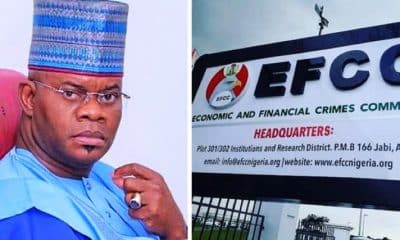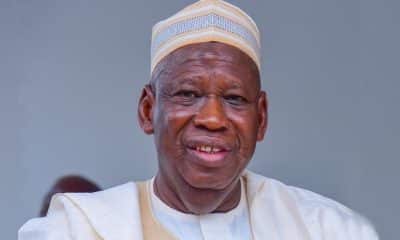Editorial
Government Must Spare Nigerians This Burgeoning Debt Burden

While Nigerians are at a loss as to how debts accumulated by the federal government rose to N26.91trn from the N9.8trn it was in 2015, they were further crestfallen by President Muhammadu Buhari’s letter to the National Assembly seeking approval to borrow an additional N2.3 trillion ($6.18billion) external loan to finance part of the 2021 budget deficit. Yet, there are several revenue-generating agencies of government that should place the country in sound financial health if only leakages in their systems and processes were blocked.
Nigeria’s total external debt stock, prior to this request stood at $33.348 billion, while the total public debt profile as of December 30, 2021, as released by the DMO in March 2021, was N32.915 trillion. The President had in another letter canvassed a concurrent approval by the legislature for a total sum of $3,837,281,256, €910,000,000 and grant component of $10,000,000 for donor fund projects under the 2018-2020 federal government external borrowing rolling plan.
The two request letters, dated May 6, 2021, came a month after the Senate and the House of Representatives approved $1.5 billion and €995 million external borrowings for the federal government to finance various priority projects and to support states facing fiscal challenges. President Buhari told the National Assembly in his August 24, 2021 letter, that the latest loan request is necessitated by the need to meet “emerging needs” and fund “critical projects” in power, transportation, agriculture, and rural development, health, education, among others.
Naija News wonders how emergent are these needs and how critical are these projects that the country had to be further led into debt at a time over 80 per cent of government revenue is used to service the debt? Are Nigerians to believe that also critical is the standard gauge rail from Kano State in Nigeria to Maradi in Niger Republic which reports says number among projects to be funded with the fresh external loans?
We wonder how the government would claim to be borrowing to fund critical projects when Nigeria sits at the bottom of the global Human Capital Index. The country’s per capita investments in health and education, which are two critical sectors that grow human capital, are among the lowest in Africa. Even the public infrastructure where the government says it sinks these loans have remained decrepit, and borrowed funds being planned for the railway project into Niger Republic which has been roundly criticized by a good number of Nigerians.
That the impact of these loans is not telling on the citizenry cannot be overemphasized. The Minister of Finance, Zainab Ahmed, had while addressing public concerns over the government’s piling of public debt, said: “We are borrowing sensibly and we are investing in rail and other infrastructure; if we do not do these investments, we will regret. These investments will return revenue in the future”.
But rather than seeking external loans to develop infrastructure, shouldn’t the government issue domestic debt for foreign investors to invest in such debt in local currency and then be paid back in naira. With the way the government is going a-borrowing, Nigeria risks slumping into a slope where portions of newly acquired loans will inevitably be used to fund recurrent expenditures. What’s then is the point of sustained borrowing when government revenue does not measure up to the obligation? It is like continuing to dig when one is already neck-deep in a hole. The government must bear in mind that sovereign default comes with a price.
As a news medium that panders to the interest of young people, we cannot but speak up against this flagrant mortgaging of the future of young and future generations of Nigerians. A responsible father bequeaths assets to his children, not liabilities. It should already be clear to the Buhari administration that the country’s debt profile is already at an unsustainable threshold. Government must therefore resist the easy option of reckless borrowing by looking inwards to cut down the huge cost of governance and the excess waste in the system.
It is regrettable that the Senate which should call the executive to order is defending the excessive accumulation of foreign debts. While we agree with the Senate spokesman, Ajibola Basiru, that, “What Nigerians should be looking at is the benefit and the advantage the society would have when the loans are taken and effectively utilized”, he should check the realities on ground vis-à-vis loans that had been approved for the government.
Nigeria should not be saddled with a Senate which does not do due diligence when it gets loan requests from the executive. Senator Basiru will be well advised to heed the counsel of his colleague, Senator Ali Ndume, who said, “When things like this (loan request) comes, you don’t just say, because you want to be good, you approve it. No. You’re supposed to look at it critically. Cross the ‘Ts’, dot the ‘Is’, ask questions, carry the people you are representing along, ask if they agree. Not that we just sit down and just approve it. We thought it might be good but the way we do it makes the people we represent look at us suspiciously”.
It is clear that Nigerians are no longer at ease with the mounting public debt, particularly as the government does not seem to have a means of repaying them. Naija News, therefore, calls for a comprehensive review of Nigeria’s debt management framework to include a close scrutiny of the government’s expenditure and revenue optimization options. Nigeria shouldn’t be this in this borrowing when the CBN, NNPC, Customs, NPA, NIS, DPR, FAAN, EFCC, and JAMB are regularly remitting billions into the coffers of government.
This, therefore, highlights the need for greater transparency and the curbing of corruption in all government agencies and parastatals. Since infrastructural development is capital intensive, the federal government should partner with the private sector in the provision of these physical amenities. This will enable it to deploy scarce resources to human capital development and not to fund the ostentatious lifestyle of the political class and their cronies. Enough of the borrowings already!












